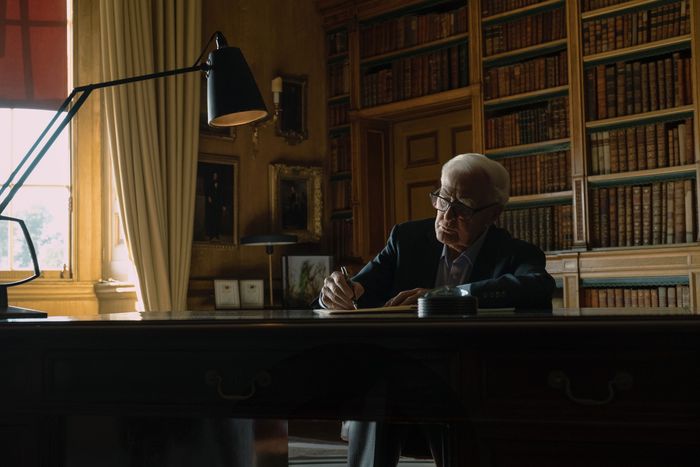
Documentarian Errol Morris’s interviews are rarely adversarial, but there’s a challenge implicit in them — the promise that their subjects will not just be examined from all angles but also, when necessary, pushed. “Have you ever thought that you might be wrong?” he asked Fred A. Leuchter Jr., the execution-equipment specialist turned Holocaust denier of Mr. Death, and got the astounding response of “No, I’m past that.” The potential for confrontation has felt more urgent whenever he’s turned his signature device, the Interrotron, on a political figure like Robert McNamara in The Fog of War and Donald Rumsfeld in The Unknown Known. And he’s made rare misses like American Dharma, in which Morris is unable to pin down a preening Steven Bannon, which is all the more frustrating. The focus of his latest film, The Pigeon Tunnel, is writer David Cornwell — better known by his pen name, John le Carré, under which he published genre-defining and enormously popular espionage novels like The Spy Who Came In From the Cold, The Constant Gardener, and Tinker, Tailor, Soldier, Spy. He’s less fraught a focus than some of the other people Morris has tangled with over recent years, yet the result nevertheless feels like a duel, one whose stakes are undetermined.
That sensation that Morris and Cornwell are never quite in agreement over why they are there is the most compelling thing about The Pigeon Tunnel, a brisk, enjoyable, and minor work that serves as a cinematic epilogue for its subject, who died in December 2020 at the age of 89. It begins with Cornwell and Morris talking about the nature of their relationship with Cornwell explaining, “I needed to know who I was talking to,” and pointing out that in different films, Morris has been spectral, or present, or godlike. As his customary offscreen voice, Morris is decidedly part of The Pigeon Tunnel, which shares its title with a fragmented memoir Cornwell put out in 2016, a counterpoint to a 2015 biography by Adam Sisman that Cornwell hadn’t liked. Morris says at one point that he’s been told that he “hasn’t pressed [Cornwell] hard enough about betrayal,” though it’s unclear who has told him this and why the concept demands such attention. It’s not as though Cornwell, who’s sharp and has a patrician air as a result of the high-end education his con-artist dad insisted on, comes across as an especially slippery subject. He may not have liked to give interviews, but he willingly signed on to do this one, which would be his last.
The issue seems more that Morris didn’t get what he wanted or wasn’t sure what he wanted to get in the first place. Cornwell was a phenomenal writer of stories about characters who were isolated, addicted to deception and doubt, working in service of a crumbling empire. His greatest creation, George Smiley, was a brilliant spy who was also squat, unassuming, and a cuckold — an anti–James Bond, embodying all of the trudging tradecraft of the job and none of the glamour. Cornwell worked in intelligence himself, at MI5 and MI6, though he confesses that as a junior officer, he didn’t get to see much of what he refers to as “the secret world” and invented his own version in his books. He invented details about his own life as well, he admits, or at least layered false memories — of the house he grew up in, of seeing his father in prison — on top of whatever truth was there. That father, Ronnie, features prominently in The Pigeon Tunnel, so named for another vivid, and presumably accurate, recollection from Cornwell’s past of Ronnie taking him to a casino in Monte Carlo where people could shoot alongside the water.
Pigeons would be released through tunnels and fly out toward the sea to emerge as targets for the men waiting above. If they escaped the bullets, the birds would inevitably return to the roof of the casino, where they were born and where they’d be trapped and sent back out toward their doom. “Quite why this image has haunted me for so long is something the listener is perhaps better able to judge than I am,” Cornwell says, though the way that Morris renders the account in an evocative re-creation leaves little doubt as to why it might linger in someone’s mind. Cornwell, who speaks in front of a backdrop that looks like a crazy quilt, is a compelling interviewee who makes clear the connections between his childhood and his interest in espionage, and in performance and in the idea of a world full of either dupes or string-pullers, without needing to underscore the relevance. The film folds in old photos and archival footage and clips from adaptations of Cornwell’s work, moving through its subject’s life with a restlessness that makes it seem as though Morris were looking for a revelation, or a crux, that he was never able to find. It wasn’t a surprise to read, in the curiously testy interview Morris gave with David Marchese in the New York Times, that he described his two earliest works, Gates of Heaven and Vernon, Florida, as the best films he’s ever made. Certainly, they were the most idiosyncratic and unburdened by expectations or celebrity, whereas if The Pigeon Tunnel is a duel, it’s one that ends in a draw.
More Movie Reviews
- The Thriller Drop Is a Perfect Addition to the Bad-First-Date Canon
- The Accountant 2 Can Not Be Taken Seriously
- Another Simple Favor Is So Fun, Until It Gets So Dumb


